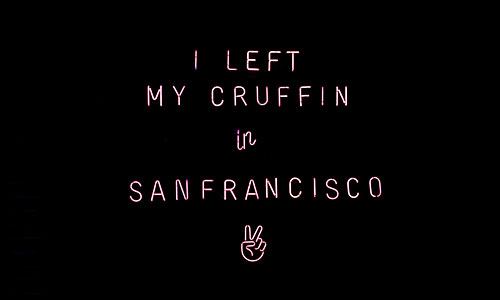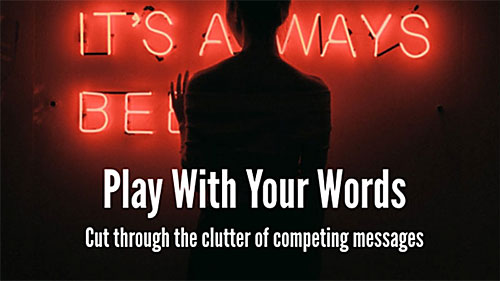Create new terms by merging old ones
I was working on a story today when a writerruption occurred: My brother sent me photos of The Cutest Kid In the World — aka my niece. I got distracted and missed my deadline.

Not really. But don’t you love the word writerruption?
I made it myself, with a cool word tool Wordoid. More about how to do that in a minute.
But first, let’s look into the fascinating world of neologisms, or the practice of creating new words.
Smash words together like Shakespeare.
Smirch was a verb, writes Barbara Wallraff, author of Word Fugitives: In Pursuit of Wanted Words, before Shakespeare added the prefix be- to it. And impediment was in use for at least 200 years before Shakespeare came up with impede.

The bard invented the un- prefix, as well as the words unaware, unnerving, uncomfortable, unearthly, uneducated, unsolicited and unreal. He also created the words madcap, ladybug, eyesore and eyeball, among many others.
The first people to “neologize publicly on purpose,” Wallraff writes, were English writers Lewis Carroll and Edward Lear. Among other neologisms, Carroll, author of Through the Looking Glass, brought us chortle, a combination of snort and chuckle.
Portmanteau: “two meanings packed up into one word.”
— Lewis Carroll, author of Through the Looking Glass
That makes chortle a portmanteau, a combination of two or more words into one new word. Portmanteau — think Travelocity — comes from the English portmanteau luggage, a piece of luggage with two compartments. (Or as Carroll wrote, “two meanings packed up into one word.”)
Our language is filled with portmanteaus: smog (from smoke and fog), motel (motor and hotel) and brunch (breakfast and lunch).
How to play with portmanteau.
Ready to make like Shakespeare and coin your own word? Here are four techniques to try:
1. Create a Wordoid.
Wordoid is designed to help you create a catchy name for your business. But you can also create words to use in your message, as well.
Just plug in a word or word fragment, click a button, and get your Wordoids. Here are some of the results I got when I plugged in the words edit, coach, consult, rewrite and train:
- Editation
- Coachieving
- Consultimate
- Illustrain
- Importrained
- Rewritering
- Rewriterian
- Traineer
How can you use Wordoids to make your copy more creative?
2. Combine two words.
Sam Horn, the goddess of developing creative book titles, offers this process for coining half-and-half words.
A. List your key words in two columns. Also consider prefixes and suffixes you can add to your key words to create new words.
B. Review the list. Try combining at the first half of the key words in column A with the second half in column B.
C. Now try combining the first half of the key words in column B and the second half in column A.
| Bad | + | Advocate | = | Badvocate |
| Chart | + | Article | = | Charticle |
| Glamour | + | Grunge | = | Glunge |
The result: New words like the term one of Horn’s clients came up for her book about how obesity can lead to chronic diseases. You guessed it:
Diabesity.
3. Gain inspiration from online tools.
Check out online tools like Verbotomy and WordSpy for novel words that surprise and delight you. Here, a handful from WordSpy:
- Apostrofly n. An errant or misplaced apostrophe, particularly one that seems to have been added randomly to the text.
- Diworsify v. To make something worse by diversifying.
- Googleganger n. A person who has the same name as you, and whose online references are mixed in with yours when you run a Google search on your name.
- Momoir n. A memoir about motherhood. — momoirist n.
- Proem n. A prose poem; a work written in prose but incorporating poetic imagery and rhythms.
By reading great neologisms, you can inspire yourself — almost program yourself — to coin more creative terms.
4. Model the masters.
Collect your favorites portmanteaus, take them apart, put them back together and find ways to create words that work for you and your topics.
Here are some of the best from my collection:
“Mario shrugs smugly, a sort of smrug.”
— Paul Murray, novelist, in Skippy Dies
“Capitalistas: A disease of misplaced importance. Ex: The Engineer will run the Project, and the Accountant will send Invoices at the end of each Quarter.”
— Sally Jacques, head of information management and investor services at Standard Bank South Africa
“Profanitype: the special symbols used by cartoonists to replace swear words (points, asterisks, stars, and so on).”
— Rich Hall, writer on Not Necessarily the News, who came up with the term sniglet for these words
“Dialexia: being terrible at transcribing phone numbers.”
— Barbara Wallraff, author of Word Fugitives: In Pursuit of Wanted Words
“CFNO: A CFO (Chief Financial Officer) whose answer always seems to be ‘No’ no matter how large or small the purchase request. (Not to be confused with COR: Chief Obstacle Remover).”
— BuzzWhack
Play with portmanteau, noodle with neologism.
Freshly minted words get more attention than tired coinages. So what words can you smash together to make new ones?
Who knows? In a couple of hundred years, it might be hard to believe they haven’t always existed. And in the meantime, they’ll make your message more engaging.
Share your best — or your favorite — neologism.
|
Learn to cut through the clutter of competing messages — with neologisms, portmanteau and other forms of wordplay at our Master the Art of the Storyteller Master Class on July 25-26 in Portland.
Don’t miss out: Just 6 tickets left.
This class will sell out.
|
